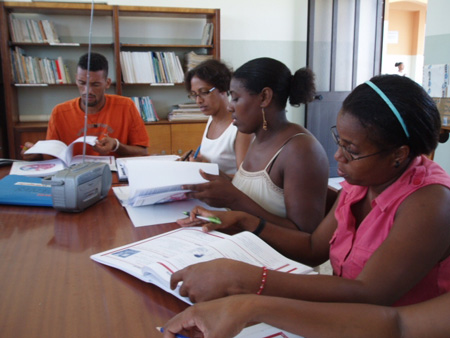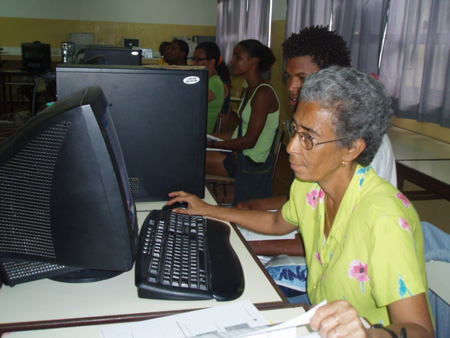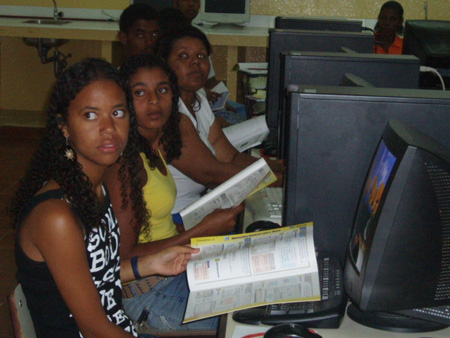Cape Verde
Distance Learning for Adults: Radio ECCA Project for Socio-economic Development (Cape Verde)
Government of Cape Verde
Spanish Agency for International Cooperation
Regional Government of the Canary Islands
Country Profile
Population: 507 000 (2005)
Adult Literacy Rate: 81 % (2004)
Internet users per 1000 inhabitants: 35 (2002)
Proportion of households with a TV-set: 4% (2002)
Proportion of households with a Radio receiver: 66% (2002)
Context
The project “Training for the Design and Implementation of an Integrated Adult Distance Learning and Training System (ECCA System) for the Economic Development of Cape Verde and Related Curricular Design” (2006-2009) is jointly financed by the Government of Cape Verde, the Regional Government of the Canary Islands and the Spanish Agency for International Cooperation. It is a follow-up of the project “Adult Distance Learning (ECCA System) for the Economic Development of Cape Verde” (2002-2005). These projects were set up in support of the National Programme of Adult Education and Training, which combines distance education with adult basic education, secondary education, vocational education and training as well as community learning for development.
Like the Canary Islands, Cape Verde is an archipelago consisting of ten islands, and sees distance learning and the use of information and communication technologies as a means of reducing geographical disparities and promoting equality of opportunities in education and training for all young people and adults. The Law of Foundations of the Education System of Cape Verde establishes “Distance Education” as a special modality of education, which “shall complement recurrent and continuing education”. It also stipulates that learning achievements gained through distance education should be recognised as equivalent to those gained through formal education.
One of the major challenges faced by the current government (2006-2011) is the implementation of the national system for adult distance learning within the subsystem of out-of-school education. The use of new ICTs allows for the expansion of workplace-based socio-vocational courses and learning opportunities for young and adult job-seekers. Innovative pedagogical approaches allow for learning experiences which are tailored to participants’ characteristics, learning needs and specific vocational activities.

Programme
The general goal of the programme is to set up a national training system for adults that is based on distance learning and uses radio as a means of communication. At the same time, a curriculum and learning materials should be designed in order to improve the current face-to-face teaching system. The specific objectives are to:
- a)
- develop training activities with the ECCA Distance Learning Radio System to ensure equal opportunities in terms of access to education and to the world of work;
- b)
- develop a curricular design for a national system of distance learning for adults and to train Cape Verdean professionals in both the development of curricular design and in the development, design, reproduction and recording of teaching materials; and
- c)
- adopt the ECCA Distance Learning System, thereby providing the Directorate of Literacy and Adult Education (DGAEA) with an educational radio service and related equipment designed to improve the quality and outreach of the educational radio station network, increase Internet radio broadcasting and enable access to suitable computer equipment.
The Ministry of Education’s technical staff is being given intensive training in the use of the ECCA Distance Learning System, in order to enable them to perform the different functions and tasks related to its implementation. One of the tasks is the development of an Integral System of Adult Education and Training, based on a renewed and expanded vision of education and training. It is an integral, plural, open and flexible system intended to train youth, adults and communities. It recognises the prior learning and experiences that adults have gained during their lives. It sees the training of adults as a competency-based process of lifelong learning. It lays the foundations for a national system of recognition, validation and certification for the competencies that adults have acquired through formal, non-formal and informal channels.
A first version of a competency-based and modular Curricular Design for Adult Education and Training is being prepared. Instead of individual subjects, the curriculum focuses on four areas (communication, knowledge, citizenship and employment) in order to develop four key competencies, 22 skills and 180 items for evaluation. Most of the thematic areas support the development of the tourist industry and some, are related to food, languages (English, Spanish and French), sales and customer services, receptionist duties, leisure and entertainment, tourist guide activities, environmental education, community development and computer programmes, among others. The innovative feature of this new curricular design is the inclusion of distance learning, a methodology which strengthens the activities carried out so far by the DGAEA. To date, more than 15,000 certificates have been issued to young people and adult.

A further project activity consists of conducting a technical study for the creation of a nation-wide educational radio service to provide equipment to radio studios. In addition, there are plans to install seven radio stations and distribute computers with Internet access to nine adult education and training centres as past of the “embryonic” stage of the digital literacy project. Furthermore, the DGAEA will be equipped with printing facilities to enable support materials to be produced autonomously. A telecommunications centre will be installed to improve internal and external communication. A webpage and a virtual collaborative environment will help learners and facilitators communicate and exchange information. The project is aimed at transferring the ECCA Adult Distance Learning System technologies to the DGAEA in order to help it implement the national adult education and training system.
The ECCA Distance Learning System is based on the synchronised use of three elements: print materials, radio classes and orientation tutorials.
- a)
- The print materials comprise all the information required to follow the course. It is composed of a series of charts that accompany the radio classes. These include questionnaires, exercises and evaluations that complement and build on the contents of the radio classes. Additional support materials include video, audio, and CD-ROM materials.
- b)
- Each radio class includes a precise and active explanation of the content of charts which the learners complete following the instructions given to them by the educator. Each class usually lasts 30 minutes and provides information on the topic of the day.
- c)
- The orientation tutorials complement the print materials and radio classes and is intended to facilitate contact between learners and educators. This contact can be set up face-to-face or from a distance (by telephone or via a telematic system) and enables feedback relating to the system to be generated.
The experimental phase of the distance learning programme for adults based on the ECCA System started in 1999 and was expanded in 2002. The educational radio service was launched in 2003. The programme was expanded still further in 2005 and in 2006, it entered a new phase with the design of a new curriculum and related learning materials. Depending on the course at hand, the target groups are learners of all levels, young people and adults (with and without employment), and the general population. The programme is funded by the Government of Cape Verde, the Regional Government of the Canary Islands and the Spanish Agency for International Cooperation.

Lessons learned
- a)
- Distance learning based on ICTs constitutes an ideal solution for Cape Verde which – due to its geographic situation and state of economic development – is on its way to becoming a “knowledge society”. The education system is under great pressure to provide quality education and training based on new technologies that is tailored to meet the challenges of socio-economic development with a particular emphasis on the tourist industry.
- b)
- Distance learning based on ICTs will be more successful if it is implemented as a national education and training system in the context of a favourable education policy.
- c)
- The ICTs must be viable and adapted to the needs of the country and the context in order to provide sustainable solutions that are able to support the achievement of both national education targets and the Millennium Goals.
- d)
- The educational radio system is better adapted to the context of African countries. This is proven by the results of experiences with the ECCA System in the Canary Islands, Cape Verde, Morocco and Mauritania.
Contact
Florenço Mendes Varela
Director Geral de Alfabetização e Educação de Adultos
Rua Pedagogo Paulo Freire, nº 1
Achada Santo António
Praia
Cabo Verde
fmendes50@hotmail.com
http://radioecca.net/dgaea http://radioecca.org

 Homepage
Homepage